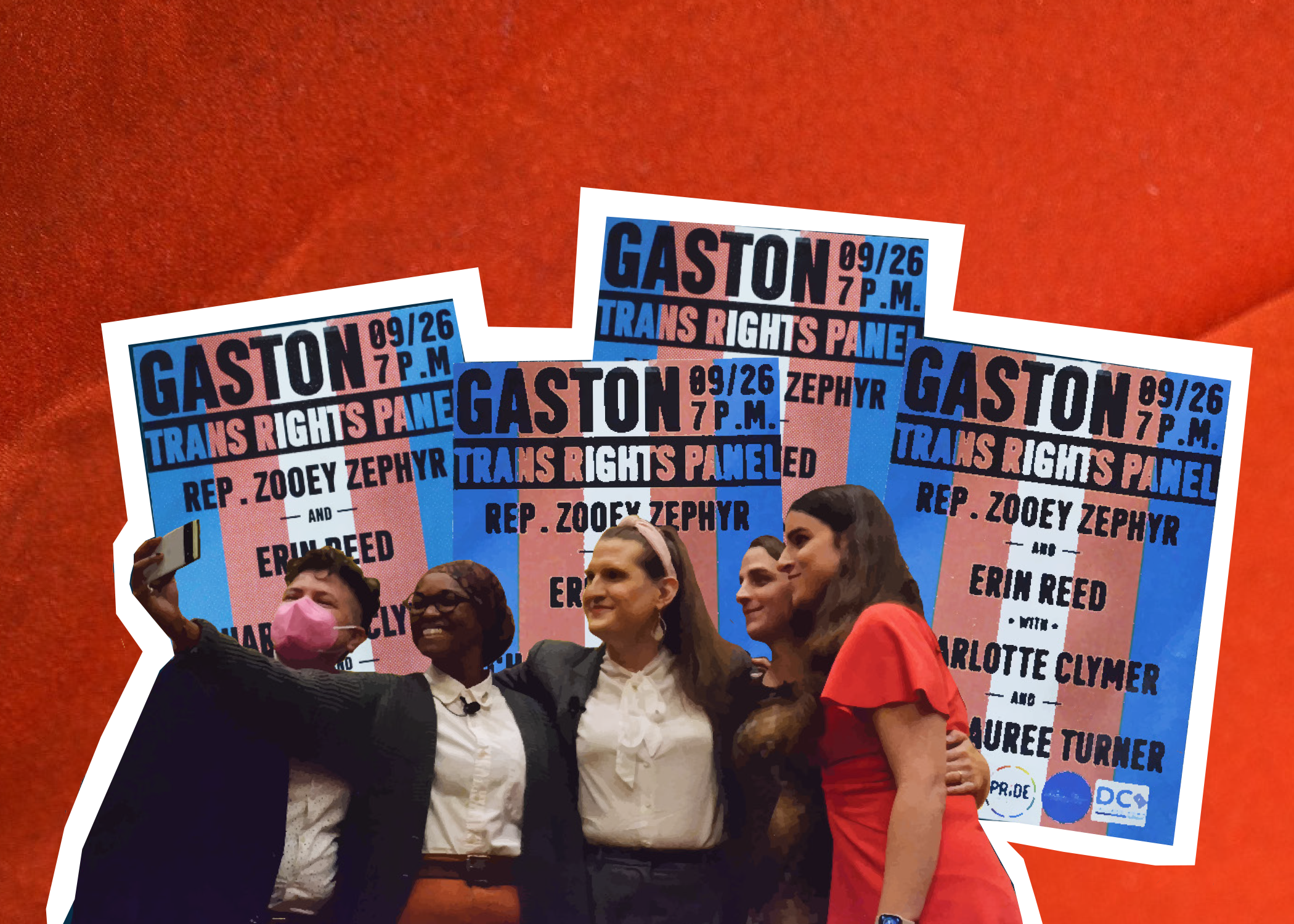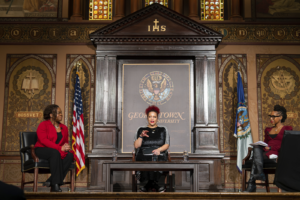Four activists made Georgetown history on Sept. 26, becoming the first panel entirely of transgender and nonbinary individuals to speak in Gaston Hall. The event, titled “Trans Rights in America,” was organized by Georgetown University College Democrats (GUCD). It gathered 300 students, faculty, and community members for a celebration of trans visibility.
“The queer story is a story of not just surviving in the margins, but thriving in the margins,” panelist Erin Reed said. Reed tracks anti-trans legislation in the United States and has created a database of gender-affirming healthcare clinics to help trans individuals find and access care.
Other panelists included Rep. Zooey Zephyr (D-Mont.), who was banned from the Montana House floor this year for speaking out against anti-trans legislation. She is the first openly bisexual and transgender legislator in the Montana House of Representatives. Rep. Mauree Turner (D-Okla.), a community organizer by training, is the first Muslim state legislator in Oklahoma and the first nonbinary state representative in the country. Writer, communication strategist, and army veteran Charlotte Clymer (CAS ’16) returned to campus after serving as a GU Politics Fellow in 2021. Dr. Amanda Phillips, a Georgetown professor of English, Film and Media Studies, Women and Gender Studies, and American Studies, moderated the discussion.
The panelists called attention to ongoing attacks on trans rights, effective ways to combat anti-trans legislation, and the importance of intersectional activism.
Organizers noted that the history of LGBTQ+ activism at Georgetown is long and complex. In 1980, Georgetown rejected calls for an officially recognized LGBTQ+ student group. The students filed a lawsuit against the university, beginning a nearly 10-year legal battle for formal recognition. The students won the court battle in 1987 and established the “Gay People of Georgetown,” which later became GU Pride. In the early 2000s, a string of violent hate crimes against LGBTQ+ students compelled GU Pride and a coalition of student organizations to demand the university provide better support for queer students. In response, Georgetown established the LGBTQ Resource Center in August 2008.
The resource center provided financial support for the panel alongside organizations like GU Politics and Georgetown Lecture Fund. Organizers with GUCD highlighted the necessity of community learning and trans visibility in light of recent widespread legislative attacks on trans rights. Since the start of 2023, 568 anti-trans bills have been introduced in state legislatures across the country. This legislation bans individuals from accessing life-saving health care, participating in school sports, and obtaining gender-affirming official documentation, like state IDs and birth certificates.
While the panelists were highlighting issues facing trans communities, across campus in Lohrfink Auditorium, Michael Knowles, a right-wing political commentator at The Daily Wire, spoke at an event titled “The Dictatorship of Minorities.” Georgetown University College Republicans (GUCR) announced the event in late August, prompting GUCD to organize a response.
“When we found out about Michael Knowles coming to campus, and having heard some of the stuff he said: ‘transgenderism needs to be eradicated,’ ‘abortion is much worse than slavery,’ we were appalled at that kind of rhetoric and someone who would spread that hateful and, frankly, violent language to people who listen to him and clearly take his word as serious,” Evan Farley (CAS ’25), GUCD’s co-chair, said.
Farley said GUCD considered several courses of action before deciding to host a panel.
“Our event was intentionally designed not to be a counter-event,” Brandon Wu (SFS ’24), Farley’s co-chair, said. “Because trans rights should not be talked about in the context of someone who’s expressed hateful, dehumanizing views on trans people.”
Farley and Wu credit the panel’s success to Felix Rice (CAS ’26), GUCD’s alumni relations and advancement director, who organized the event in less than a month. Rice said he sought to create an event that was inclusive and representative of the trans community.
As the largest progressive student organization on campus, GUCD saw an opportunity to use its institutional pull to demand the university’s attention, the co-chairs said. At a school where gender inclusivity is not the norm—from the lack of gender-affirming housing to gender identification on university portals—genderqueer students underscored the importance of events that center compassion and belonging.
“In the context of all of the threats to trans rights in America, it’s really important to find a space where people feel supported because there are very few of those spaces,” GU Pride Director of Advocacy Liam Moynihan (SFS ’25) said.
Panelists emphasized how trans rights advocates must address intersections of race, class, gender, and sexuality. “We all are a combination of privileges and oppressions,” Clymer said. “If we are not standing beside those who lack privileges in certain areas, we’re not doing what we’re supposed to be doing as engaged and informed citizens.”
The panel also advised cisgender students on how to show up in meaningful ways for the trans community.
“Allyship is synonymous with action, right? And uncomfortable action,” Turner said. “What’s the next step? Is it showing up to the rally? Is it speaking at the rally? Is it talking to an elected official? Because progress and being progressive means that you have to keep moving in order for us to get to that other side of liberation.”
To the panelists, allyship is an ongoing process, one that involves more than attending a rally; they encouraged students to engage, to the best of their ability, in difficult conversations with people holding opposing political views.
“Attending a panel amongst 200 other students at Georgetown who are also going to support the trans community, that seems like a pretty comfortable way to be an ally,” Phillips said in an interview with the Voice. “I also hope that the students who were there will continue to find ways to make the world safer for trans folks in their everyday lives.”
Throughout October, which is National LGBTQ+ History Month, on-campus organizations will continue to host events celebrating queer identities, like the LGBT Center’s OUTober.
The trans rights movement should be built on sustainable community building and organizing, the panelists said. As the event came to a close, Reed offered parting advice: “Sometimes our best activism is finding our community.”




